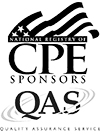Internal Controls for Fraud Prevention

Basic
Online
Description
Internal controls form a complex system that involves the collaboration of the board of directors, the audit committee, internal and external auditors, risk management personnel, investigators, operations personnel and others. This online self-study course explores the key roles in preventive controls and essential components of internal control, inherent limitations of internal controls and much more.
Key Takeaways:
- Preventive controls that can be applied to specific fraud schemes
- How to interpret the various elements of the COSO Internal Control Framework
- Strategies for identifying preventive controls for your organization
- The limitations of internal controls
Prerequisites
None
You Will Learn How To:
Ascertain why preventive controls are critical
Identify fraud risk and the types of controls needed to mitigate fraud risk
Recall the structure of the COSO Internal Control Framework and interpret its various elements
Recognize specific fraud schemes and determine which preventive controls can be applied to prevent each scheme
Identify preventive controls for an organization as a whole
Recognize limitations to an internal control environment
Table of Contents
| Lesson 1 | Why Preventive Controls Are Critical |
|---|---|
| Lesson 2 | Fraud Risk and Effects on the Control Environment |
| Lesson 3 | Types of Controls |
| Lesson 4 | Preventive Controls for Information Technology |
| Lesson 5 | Key Roles and Responsibilities of Internal Control |
| Lesson 6 | Internal Control Model |
| Lesson 7 | Legal Requirements for Anti-Fraud Controls |
| Lesson 8 | Major Categories of Fraud Schemes |
| Lesson 9 | Financial Statement Fraud Schemes and Preventive Controls |
| Lesson 10 | Asset Misappropriation Fraud Schemes and Preventive Controls |
| Lesson 11 | Corruption Schemes and Preventive Controls |
| Lesson 12 | Computer Crime Schemes |
| Lesson 13 | Organizational Controls |
| Lesson 14 | Inherent Limitations of Internal Control |
| Lesson 15 | Continuous Controls Monitoring |
CPE Information
| CPE Credit: | 4 |
|---|---|
| NASBA Information: | Auditing |
| Advance Preparation: | None |
| Last Updated: | December 2024 |
| Delivery Method: | QAS Self-Study |
Policies
CPE Credit
Please note: To be eligible for CPE credit, you must complete the final exam within one year of purchase date. You may only claim CPE credit for a course once.
ACFE Online Self-Study Courses
Features:
- 24/7 access to courses through your Internet browser
- Save time and quickly earn CPE credits with instant access, grading and printable certificate
- The flexibility to start or stop a course and pick-up right where you left off
- No additional shipping fees
Learn More about accessing your online self-study course
Learn More about online self-study courses and their features
System Requirements:
- Internet access: High-speed connection recommended
- Speakers required for video sound
 The Association of Certified Fraud Examiners, Inc. is registered with the National Association of State Boards of Accountancy (NASBA) as a sponsor of continuing professional education on the National Registry of CPE Sponsors. State boards of accountancy have final authority on the acceptance of individual courses for CPE credit. Complaints regarding registered sponsors may be submitted to the National Registry of CPE Sponsors through its website: www.nasbaregistry.org/.
The Association of Certified Fraud Examiners, Inc. is registered with the National Association of State Boards of Accountancy (NASBA) as a sponsor of continuing professional education on the National Registry of CPE Sponsors. State boards of accountancy have final authority on the acceptance of individual courses for CPE credit. Complaints regarding registered sponsors may be submitted to the National Registry of CPE Sponsors through its website: www.nasbaregistry.org/.
Ordering and Returns
Satisfaction Guarantee
If you are not 100% satisfied with any ACFE product, you may return it to us, provided it is in excellent condition, for a full refund of the item minus the cost of shipping. Toolkits and bundles may only be returned as a complete set.
Ordering & Returns Policy

